The Healing Power of Online Music Fandoms

by Lauren Alex O’Hagan
Can online music fandoms improve mental health and wellbeing? From my personal perspective, the answer is undoubtedly yes!
For most of my life, I have struggled with an anxiety disorder, but during the COVID-19 pandemic, my condition worsened to the point where it significantly affected my daily life, leaving me feeling hopeless and isolated.
Music, particularly the music of Irish blues-rock guitarist Rory Gallagher, has always been my passion. In search of support and connection, I turned to Instagram to find like-minded people.
Little did I know back then just how life-changing that decision would be.
Music for Mental Health
In July 2022, I achieved my long-term goal of visiting Rory’s grave in Cork – something I never thought possible just 18 months earlier when I was in the grips of agoraphobia. I wanted to properly document the ups and downs of my journey and how the Rory fandom on Instagram played a crucial role in my recovery, so I turned to autoethnography (Ellis et al. 2011). The full findings of my study are published in the Journal of Contemporary Ethnography, but here, I will summarise some of the key benefits based on my personal experience.

- Emotional Support and Connectedness: Online music fandoms provide a sense of community and belonging, helping to reduce feelings of loneliness or alienation.
- Safe Space for Self-Expression: These communities offer a non-judgemental environment, where individuals can openly express their opinions and emotions.
- Positive Identity (Re)construction: Participation in a fandom can help individuals (re)build a positive sense of self and purpose.
- Stigma Reduction: Music fandoms foster an environment where wellbeing can be discussed, often through music-focused conversations that evolve into advocacy for mental health.
- Sense of Agency: Managing or engaging with fanpages can restore a sense of agency, control and empowerment, enabling individuals to find new meaning(s) in their life.
- Positive Emotional Regulation: The shared appreciation of a musician or band provides a consistent source of happiness that boosts mood and helps regulate emotions.
- Peer Support and Empathy: The collective passion within fandoms creates a strong emotional bond, enabling fans to offer each other encouragement, validation and coping strategies, which can be especially valuable for individuals navigating mental health challenges.
- Accessibility and Flexibility: Online music fandoms are accessibly anytime and anywhere, making them a crucial support system for those with social anxiety or agoraphobia.
- Cross-Cultural Social Interactions: Online music fandoms bring together people from diverse backgrounds across the world, promoting cross-cultural connections and creating opportunities to learn about different perspectives, traditions and experiences.
- Creativity: Online music fandoms provide a platform for individuals to express themselves creatively and collaboratively, whether through fan art, fan fiction, blogs or other forms of content.
- Opportunities for Real-Life Interactions: Online music fandoms can lead to real-world connections, as fans meet at concerts and events, which fosters deeper relationships
- Long-Term Emotional Resilience: Regular participation in fandoms helps individuals build emotional resilience and strengthen their ability to navigate life’s challenges.
References
Ellis C., Adams T.E. and Bochner A.P. 2011. Autoethnography: An Overview. FQS 12(1),
O’Hagan, L.A. 2023. Music for Mental Health: An Autoethnography of the Rory Gallagher Instagram Fan Community. Journal of Contemporary Ethnography 52(5),
